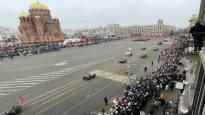The downfall of Nazi Germany began 80 years ago in Stalingrad, when the Red Army crushed the forces of the Axis Powers. ‘s Russia correspondent Heikki Heiskanen has followed the festivities on site.
VOLGOGRAD / HELSINKI Russia is celebrating today the 80th anniversary of the end of the Battle of Stalingrad.
In February 1943, Soviet forces defeated Axis forces in Stalingrad, southern Russia, which is considered a significant turning point in World War II.
The Germans, who had previously advanced victoriously on the Eastern Front, were forced to begin a retreat that eventually led to the fall of Nazi Germany and the end of World War II in Europe.
The city that experienced heavy fighting is now known as Volgograd, but in honor of the holiday it changed its name back to Stalingrad.
The city has seen a military parade in the morning and later the president Vladimir Putin is scheduled to attend the festivities.
– There has been a march in the center of Volgograd and the public has been presented with tanks from the Second World War as well as new ones. The soldiers have shouted cheers, describes ‘s Russia correspondent Heikki Heiskanen moods from Volgograd.
For local residents, the festivities have meant two days off, and the good weather has attracted many curious eyes to the streets to watch the ceremonies.
– People here seem to regard the Battle of Stalingrad as both a tragic and a triumphant event. For many local residents, a relative – father or grandfather – has taken part in these battles, Heiskanen says.
Stalingrad is known as one of the bloodiest battles in history, where several hundreds of thousands of soldiers from both the German and Soviet sides died.
The Kremlin’s message sinks into the people
During his presidency, Vladimir Putin has tried to raise Russian nationalism. Central to this is the idea that Russians should be proud of their country’s past.
However, there is little consensus among Russians about what has really been good in the country’s long history.
– There is a definite consensus that defeating Nazi Germany was a great thing. That is why the Kremlin has tried to emphasize this issue in recent years. The mistakes or crimes committed in the Second World War have been tried to be forgotten, Heiskanen estimates.
President Putin has justified the attack on Ukraine by saying, among other things, that the country’s leadership must be purged of neo-Nazis.
– In Volgograd, people tend to believe that Ukraine is run by an extreme nationalist group that wants to oppress Russian-speaking people. Yes, the Russian leadership’s message about the justification of military actions is believed here. At the same time, of course, we hope for peace, Heiskanen describes.
The name of the city will be preserved
A new one was unveiled in Volgograd this week Joseph Stalin bust. The idea that the city’s name should be permanently changed back to Stalingrad, as it was known between 1925 and 1961, has sometimes been floated.
However, this idea does not have the support of the majority.
– People are used to Volgograd. In opinion polls, two thirds do not support the name change, says Heiskanen.
Putin is scheduled to speak in the city today, Thursday. According to correspondent Heiskanen, there is no prior information that the president will make any significant declarations about new policies in Volgograd.
– On the other hand, Russian leaders often announce big things as a surprise. You never know, Heiskanen says.
You can discuss the topic until Friday 3.2. until 11 p.m.
